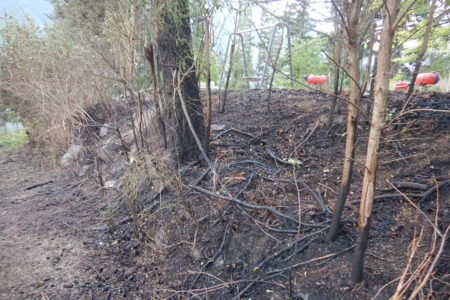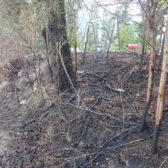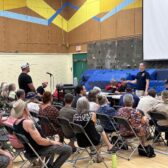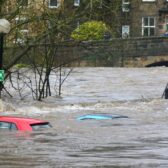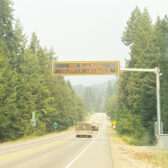Film and panel discussion on renewable energy inspire hope
Progress in the development of alternative energy sources may be moving faster than we thought, say local and world experts.
The audience the Civic Theatre on April 23 was treated to a surprisingly optimistic look at the world’s energy future at a film presentation and panel discussion co-sponsored by Nelson Hydro and the West Kootenay Ecosociety.
The film Deep Green does not shy away from the seriousness of climate change, but presents a good news story of new technologies and initiatives making headway around the world in wind and solar energy, electric cars, high-speed rail, and energy efficiency in buildings.
“We have an opportunity now, with wind and geothermal and solar energy to invest in energy sources that will basically last forever,” said Lester Brown of the Worldwatch Institute, as one of the commentators in the film.
The evening started with information about the progress of the City of Nelson’s Greenhouse Gas Emissions Reduction Plan and the success of its Ecosave Energy Retrofit rebate program, presented by the city’s Fiona Galbraith and Carmen Proctor.
Following the showing of Deep Green, the Ecosociety’s David Reid hosted a panel consisting of Nelson Hydro manager Alex Love, Michael Jessen of Zero Waste Consulting, and David Lovekin of the Pembina Institute.
Reid asked the panellists three questions.
1. What should we be doing locally to save energy?
Alex Love explained that the city is looking at the possibility of a district heating system that would use biomass (wood burning) energy to provide heat to larger buildings in the downtown core.
“From a greenhouse gas perspective,” he said, “it would take buildings off natural gas, it would put buildings on heat that is locally sourced, and it would create another utility for Nelson, like Nelson Hydro.”
Michael Jessen said we need to make buildings more airtight.
“At some point we have to start using come common sense,” he said. “Then we can do away with these technical systems that are going to rely on things like wood waste, ad infinitum into the future. If you are interested in this I encourage you to have a look at www.thetyee.ca where they running a three-part series about biomass fuel and it might give you a different perspective on whether that is the system we want to go with.”
David Lovekin said we should adopt solar photovoltaics (solar PV), which he described as “simple technology. There are no moving parts. They just convert sunlight to electricity.”
He said the cost of solar PV has come down drastically over the past few years and even though there is an initial purchase and installation cost, the savings will quickly offset it.
2. What is the role of the public in energy sustainability?
Lovekin said we all need to look at our habits of consumption.
“It comes down to challenging every choice we make, whether it be getting into a vehicle or biking or walking, looking at opportunities to reduce your personal fossil fuel consumption and use; whether when you go for a slice of pizza and you have a paper plate with a life span of about one minute, and all the processes and delivery systems to make that paper plate, you choose to put the pizza on a napkin.
“We are creatures of comfort and habit and what I have learned is to challenge every choice that you have.”
Jessen said government-sponsored energy rebate systems come and go, and don’t give a long-term reliable incentive to consumers.
“One of the things I have been promoting that Nelson needs is something called an energy saving trust,” he said. “This would be a non profit charity made up of community members and this would take over the whole energy rebate system and also be the education centre to inform people what they can do and what kind of lifestyle choices they can make.
“Live Smart BC has been discontinued by the provincial government, and the home retrofit program has been discontinued by the federal government. We cannot trust these people. They don’t see this as serious enough. If you look at what we saw in the film, it is a really serious situation we are in right now and we have got to make some changes.”
Love said this is that is reason for the City of Nelson’s Ecosave program, to “help people navigate through the constantly changing landscape, by having an ambassador who knows what is going on and can help people through.”
3. What are you most optimistic about in the face of climate change?
Jessen cited the example of the German mayor in Deep Green.
“There is real leadership happening in Germany and in many countries of the world. One of the beauties of the film is that we got a chance to see what was being done in so many places, and we have to realize we don’t have to reinvent the wheel. People have already started doing this in other places. We just have to play catch-up.”
Love was also encouraged by the film’s message that people are taking action.
“They have done that in the past,” he said. “Look at the sixties when the U.S. said we are going to put a man on the moon. A lot of people told them they couldn’t, but they did, so the opportunities for innovation are there, and in fact are happening right now. Solar PV is on the horizon and I think there are many other opportunities that people will come up with.”
Lovekin agreed that the actions of the governments of other countries are encouraging.
“We are totally roadblocked at the federal level,” he said, “and we can’t even get in the door of any politician provincially here. It is LNG full steam ahead, so we have two layers of really challenging government that want to do nothing but exploit fossil fuels.
“On the flip side, in the clean energy sector there are amazing entrepreneurs and businesses and technology happening in Canada. And China, I used to hear about one coal power plant every week and now I hear about x megawatts of electricity being generated from wind and solar. China is going off the charts in terms of renewable energy generation. And Germany has set the bar.”
Related stories in The Nelson Daily
Nelson is a municipal leader in reducing carbon emissions, say city staff (January 9, 2014)
New report recommends heating Nelson with hot water biomass energy (November 25, 2013
Nelson receives climate change research grant from European institute (September 26, 2013
Nelson homeowners flock to Ecosave program (August 2, 2012)






